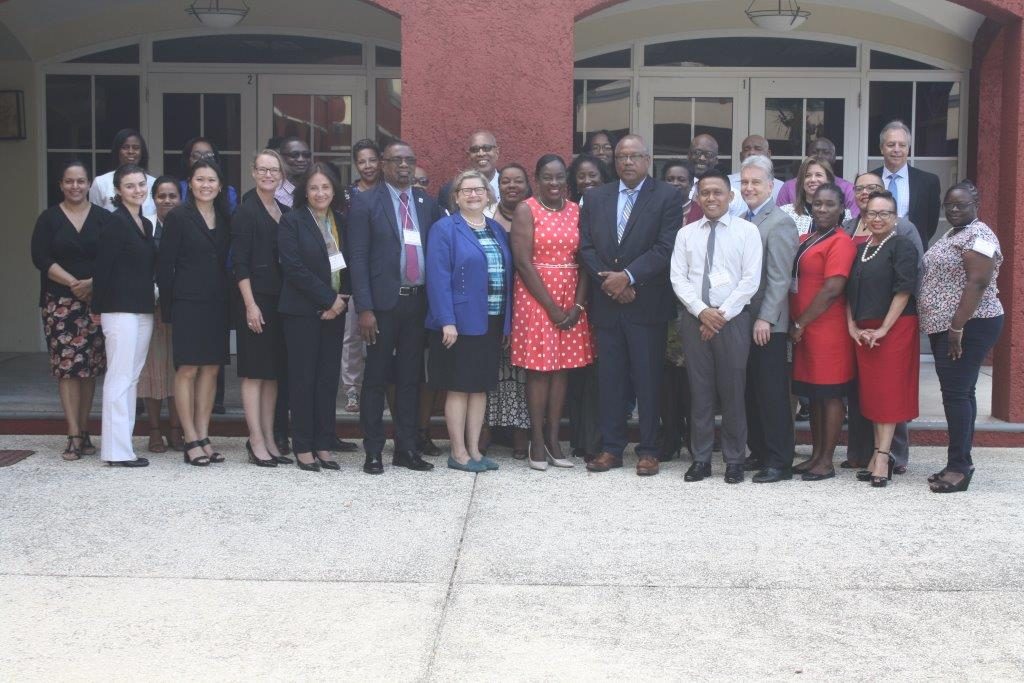
HFG building capacity for mobilizing domestic resources for healthWorkshop held to support policymakers from Ministries of Health and Ministries of Finance for domestic financing.
Image: Ms. Laura A. Griesmar, Deputy Chief of Mission of the U.S. Embassy in Barbados, the Eastern Caribbean and the OECS, Barbados Minister of Health Honorable John D. E. Boyce, M.P., Honorable Midori de Habich, Former Minister of Health of Peru, Julia Henn, Director, Health and HIV/AIDS Office, USAID/Eastern and Southern Caribbean, Lisa Tarantino, Principal Associate, Governance Specialist, Eastern & Southern Caribbean Region, HFG Project/Abt Associates, Dr. Marty Makinen, Health of Health, HFG Project/Results for Development and health finance officials from Ministries of Finance and Health of Barbados, Guyana, Suriname and Trinidad & Tobago AND leaders of respective National AIDS Programs, national coordinating bodies, PAHO/WHO, UNAIDS, and USAID
Recently, the Health Finance and Governance Project (HFG) organized a two-day workshop to support policymakers from Ministries of Health (MOH) and Ministries of Finance (MOF) in preparing concrete strategies for mobilizing domestic resources for health, with a specific focus on HIV programming. Representatives of Country Coordinating Mechanisms and National AIDS Coordinating Committees also participated. The workshop convened thirty-two health and finance experts from Barbados, Guyana, Suriname, Trinidad and Tobago, Peru, the United States, and various global and regional institutions in Bridgetown, Barbados.
Over the course of the workshop, MOH and MOF participants identified commons priorities and objectives related to HIV programming sustainability and heard presentations from global experts on strategies to achieve domestic resource mobilization (DRM).
Three key priorities were identified as foundational to the implementation of sustainable DRM plans to achieve goals for HIV programming:
Prioritizing and allowing sufficient time for quality communication between health and finance agencies is essential to building sustainable, long-term plans. This means starting resource planning early and developing strategies to adapt to an evolving resource environment. When discussing health sector outcomes, it can be helpful to adopt a medium-term planning mindset to set realistic expectations for how investments in health will be realized. The former Minister of Health of Peru, Honorable Mrs. Midori de Habich advised participants to always have a well-developed back-up plan to quickly absorb any funding that becomes available. Proactive and timely planning were important themes that underscored many of the goals and milestones discussed.
Implementing strategies to improve shared understanding between Ministries of Health and Finance, as these two institutions don’t always speak the same “language”. A lack of common indicators, nuanced dialogue, and infrequent opportunities to cross-collaborate increases the divide between the Ministry of Health and Finance. Bringing these two institutions together—through personnel exchanges for brief secondments or by investing in personnel with backgrounds in cross-disciplinary learning, can help establish a common foundation of understanding on which to base resource planning.
Building on existing political will can allow teams to strategically position resource mobilization efforts for health to address the gaps that exist, and will arise, in HIV programming. Workshop facilitators and participants discussed the unique opportunity created by this funding transition period to bring the topic of resource mobilization for HIV to the forefront of public and political conversation. Maintaining a dialogue at high-levels while engaging with the public about issues most meaningful to them are two important tactics to driving long-term, sustainable change. Simple, key messages and the need for continuous feedback were two strategies outlined to build on, and sustain, political will.
Barbados Minister of Health, Honorable John D. E. Boyce, called upon the workshop attendees to “play an important role in creating advocacy messages that put health at the top of our governments’ agendas… continued improvements rest on the responsibility of us as stakeholders to make change happen.” He emphasized the importance of demonstrating how DRM for HIV connects to overall health system strengthening as a way to ensure that political will is cultivated and sustained. By the end of the workshop, each country team presented a thorough and ambitious action plan, incorporating one or more the tools they learned about, and made commitments to work towards implementing these actions.
